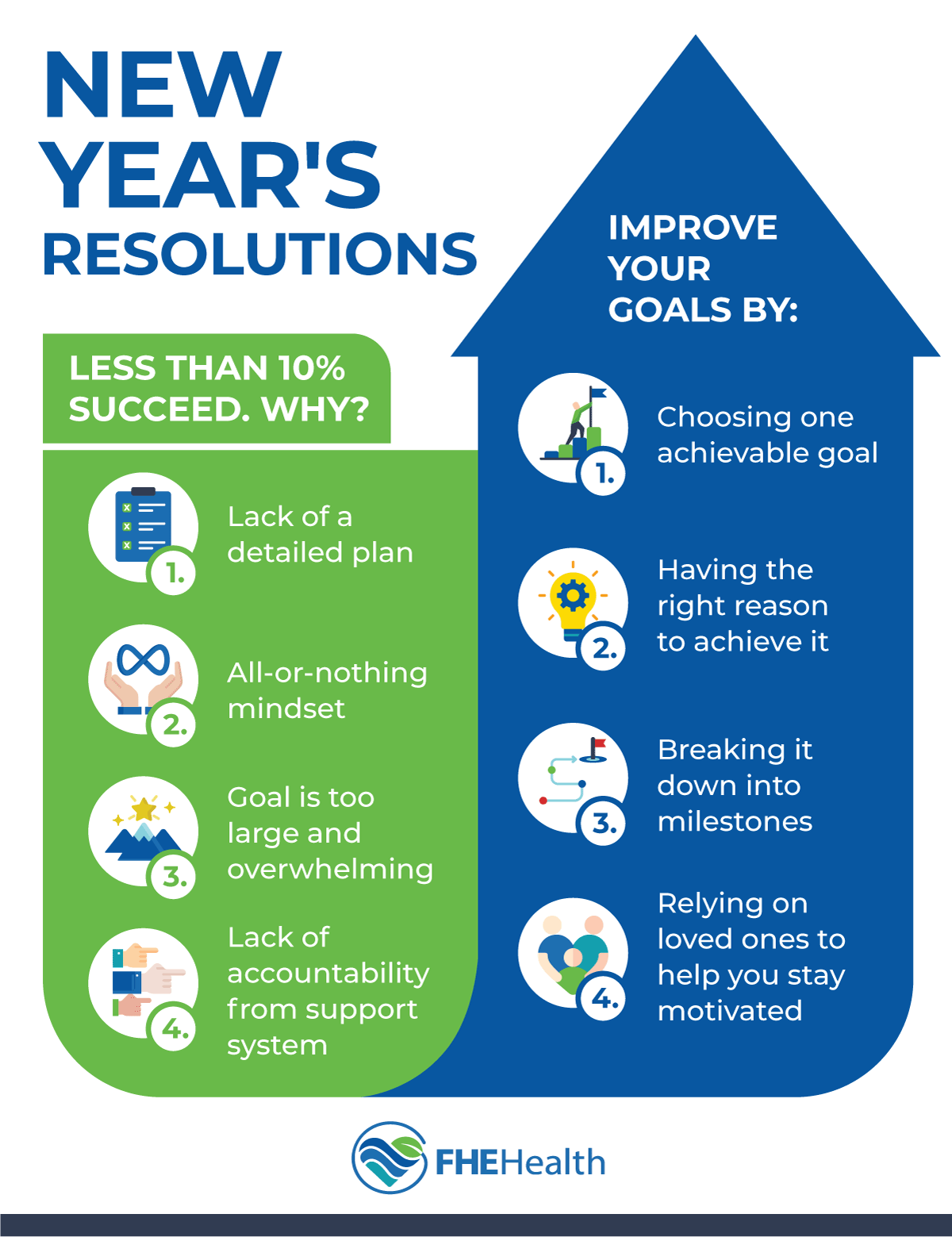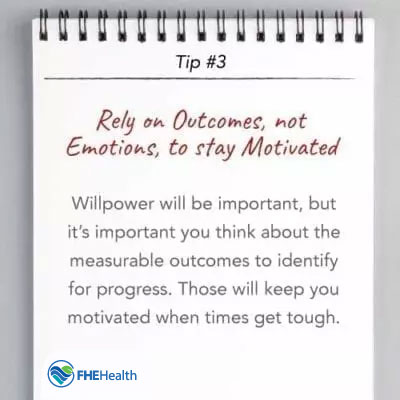
With the new year just around the corner, expect to hear lots of buzz in the media and on your social media feeds about New Year’s resolutions — specifically, how resolutions help us meet new goals and make improvements where needed. It’s the time of year when we’re expected to set lofty goals around self-improvement, with healthier eating, improved exercise habits, and saving more money topping the list of the most commonly made resolutions in most years.
It’s estimated that approximately half of all Americans make New Year’s resolutions; however, fewer than 1 in 10 actually achieve their desired outcomes, and an estimated 80% fail by mid-February, a mere 6 weeks into the year.
How Resolutions Help Us, and Why Most Resolutions Fall Flat
Most people’s New Year’s resolutions are doomed to fail for several reasons. At the core of most resolution fails is a lack of a detailed plan — we tend to set our sights on achieving a lofty goal without having a realistic idea of what it takes to get there. Remember, even simple habits have usually taken years to evolve into automatic, conditioned behaviors — we’ve become programmed to automatically resist change.
Another reason for the low success rates of resolutions is that we focus on perfection — we often view success as an all-or-nothing issue, leaving little room to acknowledge small victories or forgive minor missteps and setbacks. This black-and-white mentality ignores the effort and, for most of us, is a form of self-sabotage.
The fact is that January 1st is just another day — there’s nothing inherently special about the calendar being flipped over, although many of us see the beginning of the year as an opportunity to start fresh. If you want to beat the odds and make resolutions that make sense, you need to take the time to carefully consider if your goals are realistic and achievable and will improve your life.
Break Down Your Goal Into Weekly or Monthly Milestones
Setting a big, year-long goal can be overwhelming, which is why breaking it down into smaller, manageable milestones is a smart approach. By dividing your resolution into weekly or monthly targets, you’ll make consistent progress and stay motivated as you reach each mini-goal. For instance, if you resolve to run a marathon by year’s end, start by setting weekly mileage goals or monthly race distances to hit. That way, each milestone serves as a stepping stone toward your ultimate objective, making it feel more achievable and less intimidating.
Milestones also allow you to assess your progress and adjust your approach if necessary. With shorter-term targets, you’re more likely to notice if you’re falling behind or struggling in one area, giving you the chance to make adjustments to successfully reach your end goal. Celebrate each milestone as a victory, as it’s proof your goal is within reach. Taking things one step at a time keeps you grounded and focused, turning a lofty resolution into a realistic journey.
Maintain Healthy Boundaries
Boundaries are a big part of the treatment and recovery journey — they’re what help us stay balanced and aware of what we can do within our capacities, limits, and morals. Establishing and maintaining boundaries involves the same kinds of questions you should ask yourself before committing to a resolution, such as, “Is working toward this goal something that will strengthen my emotional, physical, or mental health, or will it jeopardize it?”
For example, while resolving to go to the gym for an hour every single day might be great for your physical health, the stress of trying to find enough time to maintain an added daily commitment might take a toll on your mental health. It could even mean sacrificing other important things in your life, such as spending time with supportive family members or participating in support groups.
Consider whether the resolutions you make will enhance your life or are simply new ways to perpetuate old patterns of addictive behaviors. For this reason, any type of goal-setting should be done solo — you need to own your goals to be truly invested in achieving them.
Find Accountability Through a Support System
One powerful way to increase your chance of success with any resolution is to surround yourself with a reliable support system. Sharing your goals with friends and family, or even joining a group that shares similar goals, can create a sense of accountability. When others are aware of your intentions, you’re more likely to follow through. Plus, a support system offers encouragement during challenging times, celebrates your achievements, and keeps you motivated when your enthusiasm wanes.
Accountability partners can take many forms. Maybe it’s a friend who’s also working on a resolution, a family member who checks in weekly, or a social group with similar goals. Online communities can also provide support through forums or social media groups that let you connect with others on a similar journey. Remember, this isn’t just about having someone remind you of your goals — it’s about knowing others are cheering for you, even on tough days. By leaning on a support system, your resolutions become shared commitments, making it easier to stay the course and make meaningful progress.
Be Honest About Where You’re at Today
While there’s nothing wrong with dreaming big, making resolutions that are completely unreachable given your current mental or behavioral health is a recipe for failure. Instead, aim to make more reasonable resolutions that are within your reach.
Before setting out to make major changes in the new year, take the time to reflect on how you’re doing right now. Consider whether you have a strong foundation to build upon — if you don’t, setting goals that are overwhelming may do little but add to any anxieties and feelings of low self-worth you’re already struggling with.
You may think you’re ready for change, but have you fully considered what it means to execute this resolution? Failure to fully consider what this entails will greatly damage your chances of long-term success.
Rely on Outcomes, Not Just Emotions, to Stay Motivated
Although having the willpower to make positive changes in your life is important, desire alone won’t get you to your goals.
Breaking down your resolutions into small, easily digestible bites that can be measured and tracked is a key to achieving success. The ancient Chinese philosopher Lao-Tzu, the founder of Taoism, is quoted as saying, “A journey of a thousand miles must begin with a single step.” This advice still rings true today, even for personal resolutions such as quitting smoking or losing weight.
Consider ways to measure the outcomes of your efforts. How will you stay motivated? You might want to set “milestone” goals to keep motivated and minimize the chances you’ll get overwhelmed.
Keeping track of your progress by journaling can help you see how successful you’ve been in sticking with your resolution, whether that means using a simple wall calendar, employing an app on your phone, or logging your progress in a diary.
Make Resolutions for the Right Reasons
All resolutions, no matter how lofty or simple they might seem, are ultimately about you making a change. It’s all too common for those in the recovery community to focus on changing to gain approval, love, and acceptance from others, reasons that rarely lead to lasting success when challenging unhealthy behaviors.
If you’re setting goals simply to please other people in your life, you’re setting yourself up for failure. When you’re considering making a change, take the time to think about what makes adopting a new behavior, or letting go of an old one, more attractive to you than simply maintaining your current status quo. Sure, having the support of your friends, family members, and recovery community in your quest to reach your goals is important, but the fact is that real change comes from within.
Ready to Make a Change in Your Life?
Do your goals for the new year include dealing with addiction and mental health issues? At FHE Health, our team of behavioral health experts is here to help you get well when you’re ready to make a change. Call us anytime — we’re available 24 hours a day, 365 days a year to give you the information you need to plan for your success.











